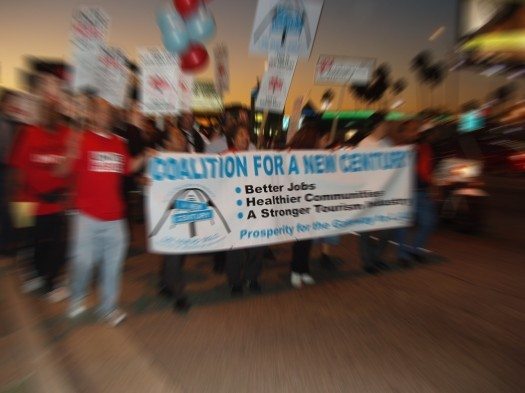Culture & Media
Living in a World Without Justice: What We Can Do

A friendly and regular reader of this blog wrote me that she recently spent a week sitting in on the trial of a teenaged girl in Compton who was tried for murder and will likely spend the rest of her life in prison. She regularly responds to my essays and often asks me to explain exactly what we can do to change the circumstances of injustice that I write about. Such situations seem – like that of the young girl whose trial she watched – impossible to affect, much less fix.
Still, my reader’s question remains a fair one, and I have given it a lot of thought. I know what I do, and it ranges on a continuum from action at a distance to action up close. On that first end of the scale, I make it a practice to sign every petition that crosses my path. Stop the Keystone XL Pipeline, support a human rights worker in Russia, end the arrest of an environmental activist in Peru, stop the firing of a hotel worker in Long Beach: I sign them all. You probably get these petitions yourself – online or in the mail – and instead of throwing them out, you probably sign them also.
Do they work? Often. More often than I would have guessed. People in positions of power are influenced by the mail they receive, even if it is mass email or a list of names so long it takes a card board box to hold them all. Letters matter. Phone calls matter. I personally dislike making phone calls even if I am just leaving a message. But doing it, even if it only takes a few seconds, can make a difference.
I also support the work of advocacy organizations financially. While I have started more than a dozen social service agencies, my wife Susan and I make our personal donations almost exclusively to organizations that advocate for social justice. Even contributions to our faith community go to a congregation that constantly involves itself with issues of low-wage workers, racism, immigrant rights and witness against nuclear arms. We figure that most people who give will donate to charities, not for projects focused on injustice.
We also participate regularly in public demonstrations. From farm worker demonstrations in the Central Valley to five-star hotels in Bel Air, I have carried picket signs and shouted slogans — whether or not it got anyone’s attention. In other more direct actions, I have joined delegations. These face- to-face meetings with elected officials or corporate spokespersons provide information or let powerful people know why they should act differently. Sometimes these matter. I participate anyway, because I do it for myself as much as I do it for others. I need to know I was not silent.
At the other far end of the protest continuum comes civil disobedience. Submitting to arrest for a nonviolent act that breaks a small law in order to dramatize another unjust law or situation has become a key part of my spiritual discipline. As a small child I was kept on a leash because I had an older brother who drowned and my mother did not want that to happen again. So when I let myself be handcuffed and held in jail under the authority of strangers, the experience goes to the core of my emotional life like no other. These actions may not cause change – although sometimes they have an effect far beyond any expectations. I do them because I need to make a witness for the sake of circumstances that must change. Activists practice nonviolent civil disobedience for many reasons.
When my friend left that girl’s courtroom, she went home to chop vegetables. Numb from the experience, it was all she could do. But doing the rote work of cutting and slicing, she resolved to act: She would write this young woman throughout her ordeal, for as long as she is imprisoned. Now that is a personal commitment of time and duration. It won’t fix the circumstances of injustice this young woman grew up in, and it will not change the consequences of that horror which she will now live out for the remainder of her life. It will address one person’s condition of isolation and by extension the brokenness of our society. Sometimes that is all we can do.

-

 The SlickJanuary 23, 2026
The SlickJanuary 23, 2026Yes, the Energy Transition Is Coming. But ‘Probably Not’ in Our Lifetime.
-

 The SlickJanuary 27, 2026
The SlickJanuary 27, 2026The One Big Beautiful Prediction: The Energy Transition Is Still Alive
-

 Column - State of InequalityJanuary 29, 2026
Column - State of InequalityJanuary 29, 2026Are California’s Billionaires Crying Wolf?
-

 Latest NewsFebruary 3, 2026
Latest NewsFebruary 3, 2026Amid the Violent Minnesota Raids, ICE Arrests Over 100 Refugees, Ships Many to Texas
-

 Dirty MoneyJanuary 30, 2026
Dirty MoneyJanuary 30, 2026Amid Climate Crisis, Insurers’ Increased Use of AI Raises Concern For Policyholders
-

 Featured VideoFebruary 4, 2026
Featured VideoFebruary 4, 2026Protesters Turn to Economic Disruption to Fight ICE
-

 The SlickFebruary 2, 2026
The SlickFebruary 2, 2026Colorado May Ask Big Oil to Leave Millions of Dollars in the Ground
-

 Column - State of InequalityFebruary 5, 2026
Column - State of InequalityFebruary 5, 2026Lawsuits Push Back on Trump’s Attack on Child Care

